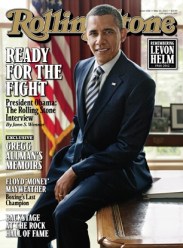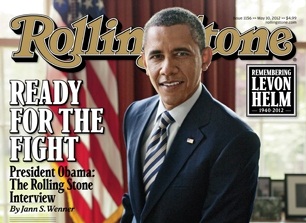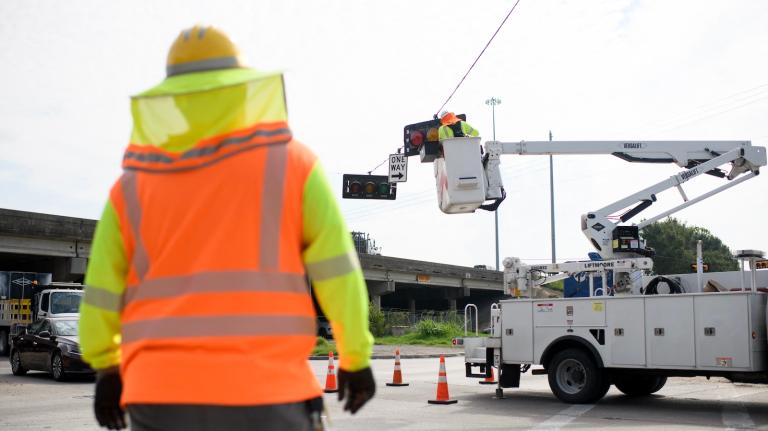 Cross-posted from Climate Progress.
Cross-posted from Climate Progress.
In a Rolling Stone interview published Wednesday, President Obama broke out of his self-imposed silence on climate change. He made some remarkable statements, including his belief that the millions of dollars pouring into the anti-science disinformation campaign will drive climate change into the presidential campaign.
Earlier this year, the president omitted any discussion of climate change from his State of the Union address. And he (or the White House communications team) edited it out of his Earth Day proclamation.
But in this interview, Obama was actually the first to bring up climate change, noting it was one of many big issues he’s had to deal with and then slamming the GOP for moving so far to the right on the issue.
The big news was that the president expects climate change to be a campaign issue:
Part of the challenge over these past three years has been that people’s number-one priority is finding a job and paying the mortgage and dealing with high gas prices. In that environment, it’s been easy for the other side to pour millions of dollars into a campaign to debunk climate-change science. I suspect that over the next six months, this is going to be a debate that will become part of the campaign, and I will be very clear in voicing my belief that we’re going to have to take further steps to deal with climate change in a serious way. That there’s a way to do it that is entirely compatible with strong economic growth and job creation – that taking steps, for example, to retrofit buildings all across America with existing technologies will reduce our power usage by 15 or 20 percent. That’s an achievable goal, and we should be getting started now. [Emphasis mine.]
I’ll believe it when I see it.
Yes, Romney etch-a-sketched himself to the far right on this issue in late October:
My view is that we don’t know what’s causing climate change on this planet. And the idea of spending trillions and trillions of dollars to try to reduce CO2 emissions is not the right course for us.
But I doubt Romney will want to talk about climate change since that statement is a major flip-flop aimed at the Tea Party extremists who now help decide GOP primaries. Also, Romney’s team presumably knows what team Obama doesn’t: Every poll makes clear that in the general election, climate change, clean energy, and cutting pollution are some of the defining wedge issues of our time.
The media also seems unlikely to bring up the issue given that they have generally ignored it as a topic for debate questions, and regular news coverage of it has collapsed.
That means if it is going to be a campaign issue, the president and his team would have to introduce it and be willing to press the case, something they have shown no inclination to do so far.
The president made two other very interesting statements on climate. First, in response to a question on the Keystone XL tar-sands pipeline, he basically said that the reason the issue flared up is because of his inability to achieve “sufficient movement to deal with the problem”:
James Hansen, NASA’s leading climate scientist, has said this about the Keystone pipeline: that if the pipeline goes through and we burn tar sands in Canada, it’s “game over” for the planet. What’s your reaction to that statement?
James Hansen is a scientist who has done an enormous amount not only to understand climate change, but also to help publicize the issue. I have the utmost respect for scientists. But it’s important to understand that Canada is going to be moving forward with tar sands, regardless of what we do. That’s their national policy, they’re pursuing it. With respect to Keystone, my goal has been to have an honest process, and I have adamantly objected to Congress trying to circumvent a process that was well-established not just under Democratic administrations, but also under Republican administrations.
The reason that Keystone got so much attention is not because that particular pipeline is a make-or-break issue for climate change, but because those who have looked at the science of climate change are scared and concerned about a general lack of sufficient movement to deal with the problem. Frankly, I’m deeply concerned that internationally, we have not made as much progress as we need to make. Within the constraints of this Congress, we’ve tried to do a whole range of things, administratively, that are making a difference — doubling fuel-efficiency standards on cars is going to take a whole lot of carbon out of our atmosphere. We’re going to continue to push on energy efficiency, and renewable energy standards, and the promotion of green energy. But there is no doubt that we have a lot more work to do.
Obama’s statement above about climate becoming a campaign issue is the last part of his answer here.
I’d say that Obama is half right in his answer. It is certainly true that if, say, Obama had been able to pass a climate bill, then the Keystone pipeline would never have emerged as such a make-or-break issue. But for those of us trying to keep warming below 4 degrees F, it always would have been a big issue.
Obama is also being a bit coy here by suggesting that lack of international progress was a key reason Keystone got so much attention. A major reason there has been little international progress is that the world’s richest country — which has by far the largest cumulative emissions — can’t even guarantee it will meet Obama’s modest 17 percent reduction pledge by 2020. American action is certainly a sine qua non for a global deal.
Yes, Obama has done some valuable things, and he certainly has been thwarted at every turn by the disinformers and their allies in Congress. They, not Obama, deserve most of the blame for inaction, as I’ve said many times. But Obama still failed to push this most important of issues anywhere near as hard as it merits.
And it’s odd for him to complain about the disinformation campaign when Obama has done nothing to debunk it. Indeed, I’ve been told by folks in the White House that it was the White House communications team that muzzled a response to that disinformation.
Finally, Obama has some interesting framing on the opponents of action:
I think it’s important to distinguish between Republican politicians and people around the country who consider themselves Republicans. I don’t think there’s been a huge change in the country. If you talk to a lot of Republicans … they don’t think we should be getting rid of every regulation on the books …
But what’s happened, I think, in the Republican caucus in Congress, and what clearly happened with respect to Republican candidates, was a shift to an agenda that is far out of the mainstream — and, in fact, is contrary to a lot of Republican precepts…. You’ve got a Republican Congress whose centerpiece, when it comes to economic development, is getting rid of the Environmental Protection Agency.
Doesn’t all of that kind of talk and behavior during the primaries define the party and what they stand for?
I think it’s fair to say that this has become the way that the Republican political class and activists define themselves. Think about John McCain, who obviously I have profound differences with. Here’s a guy who not only believed in climate change, but co-sponsored a cap-and-trade bill that got 43 votes in the Senate just a few years ago, somebody who thought banning torture was the right thing to do, somebody who co-sponsored immigration reform with Ted Kennedy. That’s the most recent Republican candidate, and that gives you some sense of how profoundly that party has shifted.
So Obama is drawing a distinction between “the Republican political class and activists” on the one hand and “people around the country who consider themselves Republicans.” I think that is a reasonable distinction to draw, but then it will be important for the president to carry this distinction to its logical conclusion on the key issues. He is basically acknowledging that climate action and clean energy and cutting pollution are wedge issues — issues that separate GOP politicians and activists (and their pollutocrat backers) from a segment of their own supporter and an even larger proportion of independents.
Again, that’s what all the polling shows, but it is most certainly not how the president and his team have been treating the issue, which they have repeatedly downplayed. Let’s hope that this interview signals a change in thinking by the president — a change that he can actually get the rest of the White House, including the communications team, to go along with. That would be change we can believe in.




